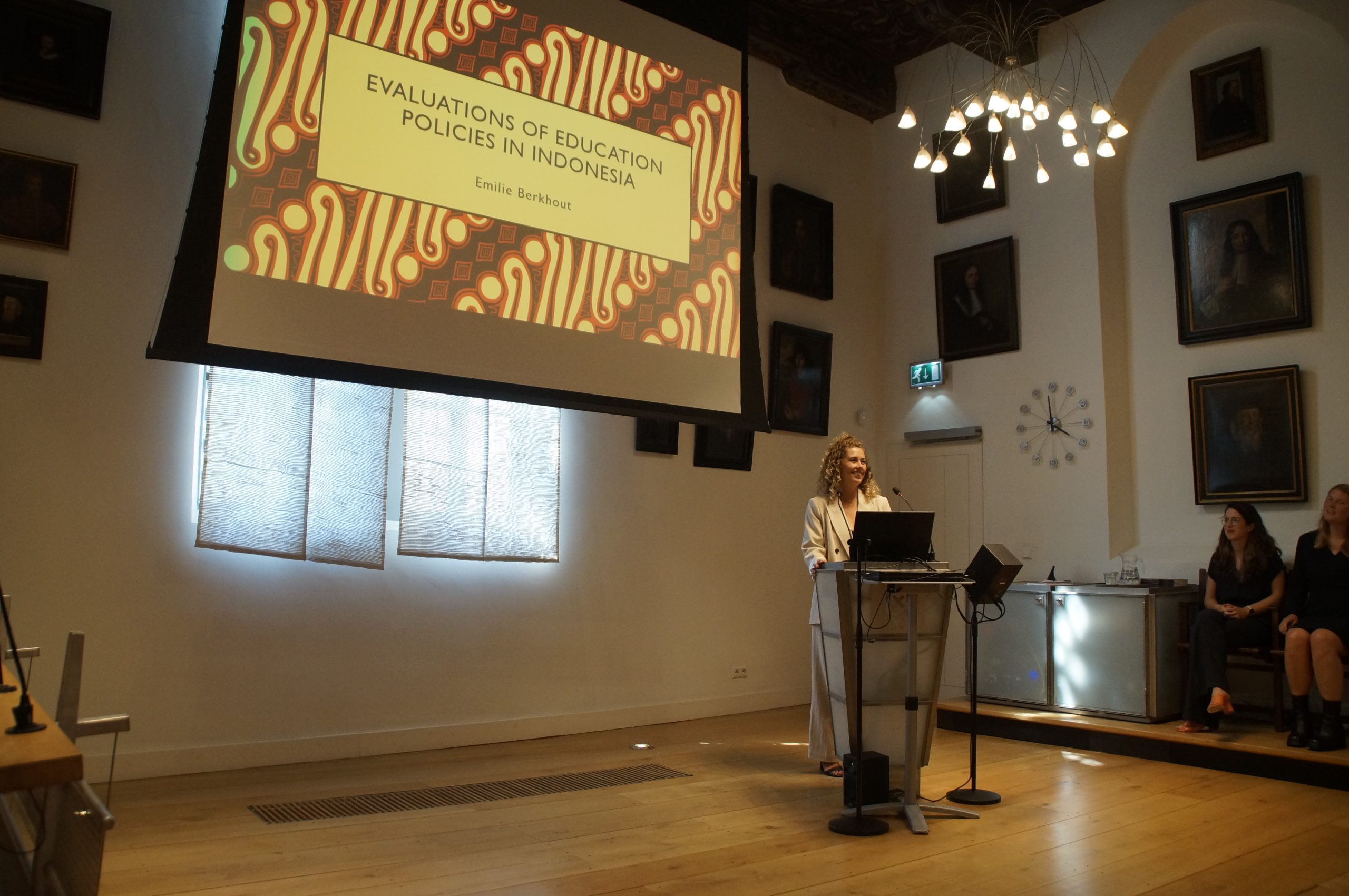
14 Jul AIGHD PhD Fellow Emilie Berkhout sets out to understand how educational policies affect learning outcomes in Indonesia
Emilie Berkhout, an AIGHD PhD Fellow, successfully defended her thesis last 7 July at the University of Amsterdam’s historic Agnietenkapel. Her thesis, entitled “Evaluation of Education Policies in Indonesia” is available on the UvA Digital Academic Repository. You can find the thesis here. A few weeks before her thesis defense, Emilie and I exchanged a few emails discussing how she arrived at her topic on education inequity in Indonesia. Here’s the story.
Emilie begins by explaining that despite massive improvements in school enrolment, the foundational skills of Indonesian children are lagging behind. Statistics from the OECD-produced Programme for International Student Assessment (PISA) test for 2018 show that within the cohort of 15-year old Indonesian students, only 30% and 28% of them were proficient in reading and mathematics respectively.
Studying this phenomenon from a policy perspective, she looked at how educational policy affected learning outcomes in students. Her work is part of a large research initiative that studies the so-called learning crisis in seven different low- and middle-income countries, called the Research on Improving Systems of Education (RISE). In one of her chapters, she shows that between 2000 and 2014, despite the Indonesian government’s doubled expenditure on education efforts, many students still fell behind in primary school and a noticeable decline in the average learning for students in the same grades occurred. Numbers like these do not spark hope but to Emilie, they also served as a challenge to discover the underlying issues which contribute to the underperformance of Indonesian students.
In the final chapter, Emilie talks about how traditional junior high school selection systems reinforce the gap between high-scorers and low-scorers by having only the former group typically admitted into better quality junior highs. Studying a school that moved away from a score-based selection to a residence-based selection, Emilie found out that interestingly, while the residence-based selection improved learning outcomes in students who usually scored lower, it came at the expense of the performance of high-scoring students. She remarks, “Achieving equitable quality education is still a challenge for Indonesia.”
Emilie has a long history with AIGHD. She was a Research Assistant from 2014-2017 when the economics department of our organization was still named the Amsterdam Institute for International Development (AIID). During her Bachelor’s, she met her current PhD Supervisor, Prof. Menno Pradhan, at the Universiteit van Amsterdam where she attended his classes as an economics student. She became interested in the complex nature of ‘underdevelopment’, the hows and whys of continued poverty in the Global South. She began her PhD with AIGHD and the RISE team in 2017 after having worked on impact evaluations of interventions in early childhood development, food security and water and sanitation access in South and East Asia and Sub-Saharan Africa.
Ultimately, she hopes that her research will contribute to the development of education policies across the globe, humbly remarking that even a little impact will suffice. Emilie also had the opportunity of joining the RISE conferences and even meeting with the Indonesian Ministry of Education which challenged her to ponder on the pragmatic issues that come from managing such large education systems like those in Indonesia.
“Knowing that my research was heard by policymakers, and gaining a network of well-known researchers, was extremely motivating for me,” Emilie remarked at the tail end of our exchange.
Now that her time at AIGHD is coming to an end, Emilie is looking forward to her new job as a Research Associate at Youth Impact, an NGO focused on scaling up projects deemed effective at bridging education and sexual health gaps.
Insightful work like this is enabled everyday at AIGHD where experts and learners from a variety of disciplines and locations come together to collaborate, discuss, and produce science-driven research. Our goal is to accelerate theory into practice, ensuring that knowledge is translated into policy at all levels of governance.
Do you want to work in a team working on impactful knowledge and practice? Keep a look out for vacancies in our news tab.
